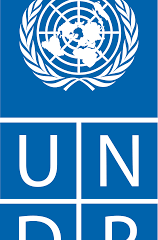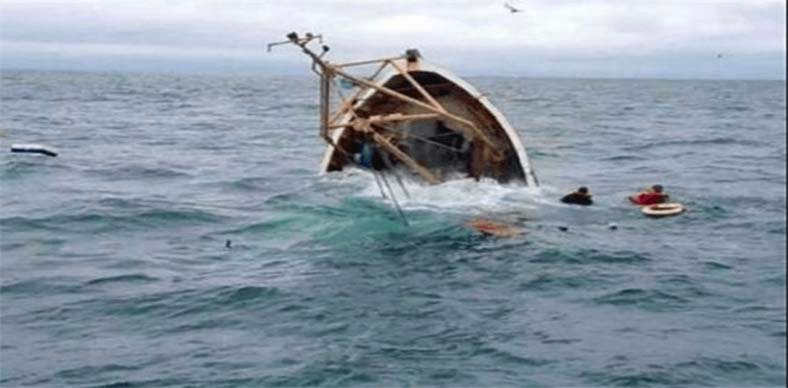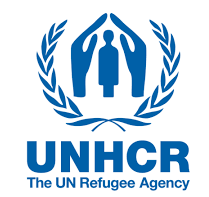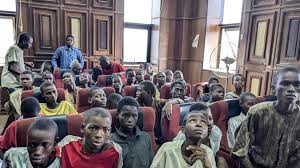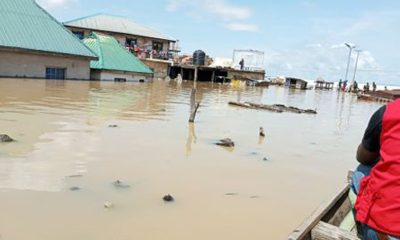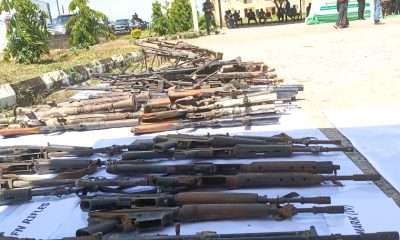Foreign News
Major Humanitarian Crisis Looms in Afghanistan — UNHCR
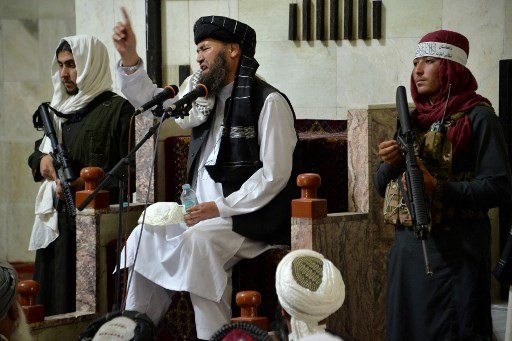
A major humanitarian crisis is looming in Afghanistan, UN High Commissioner for Refugees (UNHCR) warned again on Friday, amid ongoing uncertainty about the situation for vulnerable Afghans seeking shelter across the country’s borders.
The “reality is, the displacement crisis is inside Afghanistan”, with more than 600,000 Afghans displaced in 2021, “80 per cent of which are women and children,” said UNHCR spokesperson, Babar Baloch, who was speaking from Pakistan.
In an appeal to the world not to turn away its attention or focus from Afghans and Afghanistan, he warned that we cannot allow this “to become a humanitarian catastrophe”.
Describing the situation at the country’s borders with Pakistan, Baloch said UNHCR had not seen such a “large refugee influx” crossing over into Pakistan and Iran before.
The explanation for this is unclear: “It could be that some of those people may not think they have the right documents, others may not be so comfortable in terms of confronting armed guards at the borders,” he said.
“Afghans are still able to come through Pakistan,” he explained, “but it is very regulated,” and you must show documents such as your ID card, passport or visa.
Baloch’s appeal follows the UNHCR’s repeated call on Tuesday for Afghanistan’s neighbouring states to keep their borders open to those fleeing.
States must provide urgent protection to Afghan journalists and media workers, who fear for their lives and are seeking safety abroad, UN-appointed independent rights experts said on Friday.
The safety of women is of particular concern as they are facing heightened risks since the Taliban’s political takeover of Afghanistan,” they added, as “they may be targeted for working in the media or simply being a woman in public life”.
Reminding the Human Rights Council of the various resolutions on the safety of journalists adopted in recent years, the experts called for expedited visas, assistance with evacuation, and open borders for those who wished to leave Afghanistan.
Reports of targeted killings of journalists and their family members, home raids, threats and intimidation in areas controlled by the Taliban, have sharply increased in recent months, according to the rights experts.
This is taking place “in a context where Afghanistan is already considered one of the most dangerous countries for journalists,” they pointed out.
They called on the Council to consider setting up “an investigative and monitoring mechanism for accountability for all human rights violations that have been taking place.
The experts included attacks, reprisals and violence against journalists and media workers.
Accountability for human rights violations is critical not only for individual justice but also the prevention of future violations,” they argued.
Emphasising the crucial prevention role of the Human Rights Council, they called on the Council and all States to do their utmost to preserve the hard-won gains for media freedom, including for women journalists and media workers.
“Last week’s Council resolution on human rights in Afghanistan fails to address the specific risks faced by journalists and human rights defenders in the country,” they pointed out.
“The safety of journalists, women and men alike, human rights defenders and gender equality activists, must be a key consideration of their engagement on the human rights situation in Afghanistan.
“It is imperative for all States to stand firmly with the people of Afghanistan,” the experts said.
Independent human rights experts are appointed under the Special Procedures of the Human Rights Council, and are not UN staff, nor are they paid for their work. (NAN)
Foreign News
51 killed by Severe Storms in Spain

At least 51 people have died in the severe storms in Spain, specifically in the Mediterranean region of Valencia, the Spanish news agency Europa Press reported on Wednesday.
The report cited the regional government in Valencia.
Torrential rain and widespread flooding have wreaked havoc across Spain, and several people are reportedly still missing, according to the authorities.
Rescue operations are ongoing in many areas.
The situation is particularly dire in the Mediterranean coastal regions of Andalusia, Murcia and Valencia, which are very popular with holidaymakers.
The regional leader of Valencia, Carlos Mazón, has called on residents to move to higher ground.
In some areas, residents were trapped in their homes and sent emergency messages via social media, the newspaper El País reported.
In addition to heavy rainfall, there was also hail and strong gusts of wind, according to the national weather service AEMET.
“The hailstones were the size of golf balls. It seemed like the end of the world,’’ farmer Mercedes González, 46, told El País.
The storms have caused rivers to overflow, flooding streets, homes, and fields, with cars and trees swept away by the floodwaters.
The area of rain is expected to move north-east today.
However, a severe weather warning remains in place for large parts of the country.
The weather service said that the situation across Spain would not fully calm until Thursday.
In the south and east of Spain, motorways and rural roads had to be closed in many places.
Air and rail transport were also affected. Classes were cancelled at numerous schools and universities.
Due to a landslide, a high-speed train travelling from Málaga to Madrid derailed shortly after departure with 291 passengers on board.
However, there were no injuries reported, Spain’s state-owned railway Renfe said.
The storm with heavy rain had already hit Mallorca and other Balearic Islands on Monday.
The situation there has eased, although a yellow storm warning was still in force for some areas, including Mallorca.
Heavy rainfall events have become more frequent and intense worldwide, largely due to climate change.
As global temperatures rise, warmer air holds more moisture, leading to increased precipitation levels.
However, flooding is not solely a result of changing weather patterns.
Other human activities, such as urban development, deforestation, and inadequate infrastructure, also contribute significantly to flood risks. (dpa/NAN)
Foreign News
WHO Accuses Israel of Denying Medical Specialists’ Entry to Gaza

The World Health Organisation (WHO) has accused Israel of barring medical specialists from entering Gaza to support clinics in the besieged enclave.
The WHO said since August, eight organisations and over 50 specialised personnel had been affected by Israel’s blockade.
The specialists were intended to provide crucial support for various medical services, as well as psychological support for healthcare workers at facilities including the European Gaza Hospital and the Nasser Hospital, the WHO said.
It was reported that among the organisations denied entry was the U.S.non-profit Palestinian American Medical Association, which supports Palestinians in need of medical care.
According to the WHO, this marks the first instance in which Israel has denied entire organisations the ability to participate in relief efforts for the Gaza Strip.
The WHO reported that in the past week, support teams conducted 25 per cent fewer operations than usual.
With only 17 out of 36 clinics and 43 medical practices remaining partially operational, the WHO emphasised the irreplaceable role of these external teams in providing essential medical services.
The WHO called for full access for emergency aid teams. (dpa/NAN)
Foreign News
Germany must Ensure Ukraine War Does not Spread to NATO – Scholz

It is Germany’s responsibility to make sure that a war between Russia and Ukraine does not become a war between Russia and NATO, German Chancellor Olaf Scholz.
He said this as he repeated his “nein” to sending long-range weapons to Kiev.
“I don’t consider this to be a proper delivery and that’s how it will stay,” Scholz said after a European Union summit in Brussels.
Scholz rejected key points in Ukrainian President Volodymyr Zelensky’s “victory plan” out of concerns of future escalation.
Zelensky presented his “victory plan” at the meeting and called on Scholz, again to send him Taurus cruise missiles.
The Ukrainian leader believes a deterrent missile arsenal could force Russia into peace negotiations.
Scholz also maintained his stance against a quick invitation for Ukraine to join NATO, as outlined in Zelensky’s plan.
The United States also opposes a fast-track NATO entry for Ukraine.
The chancellor referred to the resolutions of the most recent NATO summit in Washington, which offers Ukraine a general assurance that it could no longer be stopped on its way into the defence alliance.
He further said all allies must agree that NATO conditions are met for an invitation.
These include reforms in the areas of democracy, the economy and the security sector.
Scholz also used the occasion to take a swipe at his main opposition in the Bundestag or German parliament, Christian Democratic (CDU) leader Friedrich Merz.
He complained that Merz flip-flopped on Taurus deliveries, taking a no-delivery position before key elections in east Germany and changing his position after that. (dpa/NAN)





